 There
was once a time when a jazz critic could listen to and review
every jazz album that was released in a given year (1950s).
Today, hundreds of albums are released daily, and in the genre
of World Music, hundreds are released weekly, so it’s
impossible for one person to be up to date on the latest, which
is why festival programmers are so important. They, along with
our radio and webshow hosts, do our listening, our selecting
and de-selecting. They separate the wheat from the chaff, the
good from the bad and the ugly. That Nuits d’Afrique is
the biggest and best festival of its kind in North America is
in large part thanks to the dedication and nuanced ear of Frédéric
Kervadec and his team. No surprise that this year’s 30th
anniversary festival was a runaway success, despite a couple
of days of inclement weather.
There
was once a time when a jazz critic could listen to and review
every jazz album that was released in a given year (1950s).
Today, hundreds of albums are released daily, and in the genre
of World Music, hundreds are released weekly, so it’s
impossible for one person to be up to date on the latest, which
is why festival programmers are so important. They, along with
our radio and webshow hosts, do our listening, our selecting
and de-selecting. They separate the wheat from the chaff, the
good from the bad and the ugly. That Nuits d’Afrique is
the biggest and best festival of its kind in North America is
in large part thanks to the dedication and nuanced ear of Frédéric
Kervadec and his team. No surprise that this year’s 30th
anniversary festival was a runaway success, despite a couple
of days of inclement weather.
Speaking of
the tops, mention must be made of the festival’s two off-the-cuff
masters of ceremony: the effervescent Willy B. Rose and charismatic
Eric M’Boua. In the latter’s case, what’s
to be done when you’re suffering from mal au Drogba?
You accept an invitation to fly from Abidjan (Cote d’Ivoire)
to Montreal and become part of a team spirit that knows how
to get things done. Willy and Eric are a class act, quick on
the wit, indefatigably creative and infectiously catalystic.
During a period of heavy rain, they came up with this nugget:
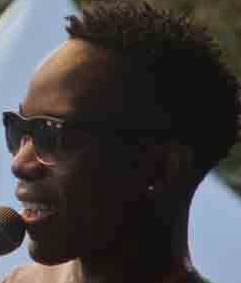
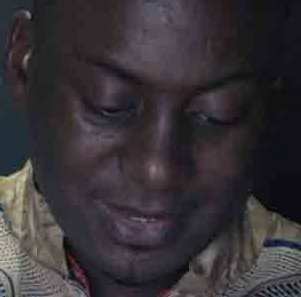
Just as important
as the work up front is their behind the scenes rapport with
the musicians. I spent five fun-filled days and magic nights
with these guys back stage and without fail, they individually
welcomed all the performing musicians, made them feel comfortable,
encouraged them, hyped them up, so by the time they hit the
stage they were primed to give their very best. And that’s
exactly what Montreal got for 13 days and nights of music –
nothing but the best.
In terms of
locality, an interesting addition to this year’s festival
was an area dedicated to a small food court and intimate stage,
where throughout the day guest musicians would explain and demonstrate
their native instruments. The mostly African food court was
located in front of the musicians’ quarters and back of
the stage so the area in-between quickly turned into a quasi
behind-the-scenes meeting place for 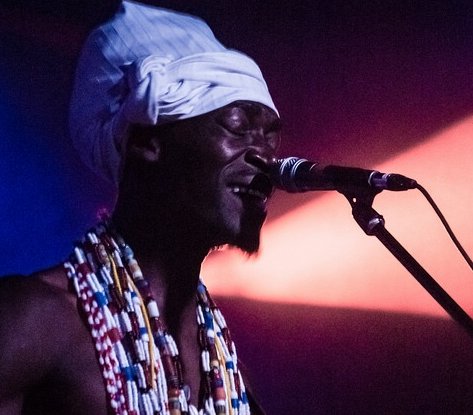 the
musicians, and an informal fashion runway featuring traditional
African dress in its myriad colours and time-tested combinations,
which of course attracted the general public who were only too
happy for the occasion to mingle with and iPhoto or iVideo their
favourite performers.
the
musicians, and an informal fashion runway featuring traditional
African dress in its myriad colours and time-tested combinations,
which of course attracted the general public who were only too
happy for the occasion to mingle with and iPhoto or iVideo their
favourite performers.
Togo’s
Vaudou Game opened the festival with a rousing first set, which
included, from their last CD, Apiafo, the very haunting
“Dangerous Bees.”
The following
night, the BKO Quintet from Mali provided a lesson on what you
can coax out of a stringed instrument as Abdoulaye Kone created
a 21st century home-away-from-home for the djelingoni.
In his sure hands and mercurial fingers, the sound he produced
was at once frenzied and foreboding, as well as reflecting the
general African preference for the clipped ( as opposed to held)
note – one that disappears almost as soon as it is plucked,
like a drop of rain on hot sand.
Taking liberties
with a Stevie Wonder song title, Inna Modja’s meticulously
distorted, hyper-synthesized, post-post-hip sonic preferences
were a “zillion light years away” from Mali. Her
only connection to her roots -- as if to appease her consummate
disaffection -- was the non-stop video streaming in the background
that showed off her pulchritude and willowy figure as she self-consciously
made a point of getting her feet down and dirty in the back
streets of Bamako. Based on the music, all of which was programmed
and pumped through the latest sound technology, including her
voice-boxed voice which was split into four – none of
which belonged to her – one suspects she can’t wait
for the next techno-gimmick to hit the market. But, it must
be said, and for all of the above reasons, everyone I spoke
to loved her show, regarded it as an unqualified festival highlight,
which meant that I (unapologetically) was the odd-ear-out.
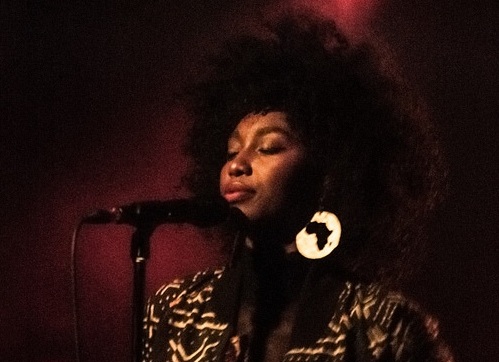
Among the newer
groups on the cusp of discovery is Proyecto Iré, winner
of the prestigious Sylvie d’Or. Blending Cuban, groove
and soul, their original music combines compelling rhythms and
slick horn arrangements in support of arresting melodies memorably
delivered by the unforgettable presence and vocals of frontman
Oscar Fuentes. His voice, fat and oleaginous like Alberta crude,
can shoot out tongues of hot bitumen on the one hand and chunks
of gravel on the other. Keep an ear out for this group; they
have a winning formula and were a festival surprise, but no
surprise if you have already seen them.

 After
years of problematic experimentation with sound and composition,
Montreal’s Nomadic Massive has finally put it all together
with a more refined and ear-friendly re-invention, without sacrificing
the energy and spontaneity that characterize their live performance.
They are a caffeine-stoked, 12-person, polygot collective that
seamlessly meld soul, rap and hip-hip. They now wisely leave
a lot more space in their attack-dog format, and their compositions
are much more likely to include very welcome key changes and
timely modulations in texture and volume. The ‘bad plus’
in this group is the ever so pristine, controlled and highly
emotive voice of singer Meduza Ma’at (think of Om Kalsoum
in a higher octave). Since there’s no telling how far
this group can go, make sure you hitch a wagon to their star
– and hold on for dear life.
After
years of problematic experimentation with sound and composition,
Montreal’s Nomadic Massive has finally put it all together
with a more refined and ear-friendly re-invention, without sacrificing
the energy and spontaneity that characterize their live performance.
They are a caffeine-stoked, 12-person, polygot collective that
seamlessly meld soul, rap and hip-hip. They now wisely leave
a lot more space in their attack-dog format, and their compositions
are much more likely to include very welcome key changes and
timely modulations in texture and volume. The ‘bad plus’
in this group is the ever so pristine, controlled and highly
emotive voice of singer Meduza Ma’at (think of Om Kalsoum
in a higher octave). Since there’s no telling how far
this group can go, make sure you hitch a wagon to their star
– and hold on for dear life.
The final day
fittingly belonged to Morocco’s Labess, which is an informal
greeting in Arabic = (what happening, man)? Arabic music is
arguably the saddest music in the Milky Way. Its undeviating
loyalty to the minor key is born in the swelter and fry of the
Sahara and the strict laws of its culture. Theirs is a music
that takes its shape from the camel trails that twist and 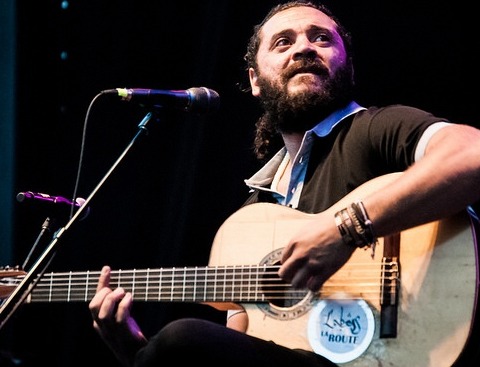 coil
and convulse as they approach the roaring traffic's boom of
the big city before shuddering to a halt, which is when Labess
takes over, with Nedjim Bouizzoul on a plaintive guitar, working
out a catchy flamenco riff as the tempo imperceptively picks
up and intensifies; the djelllaba comes off, jeans
are donned, a cool, serene brass duo enters the fray, and then,
hewed out of granite and tempered in hot dry wind, the human
voice begins its ascension, joined by rousing percussion, and
suddenly, magically, a tragic music is transmuted into riotous
joy, as the audience jumps to its feet and claps its hands –
and the celebration is on.
coil
and convulse as they approach the roaring traffic's boom of
the big city before shuddering to a halt, which is when Labess
takes over, with Nedjim Bouizzoul on a plaintive guitar, working
out a catchy flamenco riff as the tempo imperceptively picks
up and intensifies; the djelllaba comes off, jeans
are donned, a cool, serene brass duo enters the fray, and then,
hewed out of granite and tempered in hot dry wind, the human
voice begins its ascension, joined by rousing percussion, and
suddenly, magically, a tragic music is transmuted into riotous
joy, as the audience jumps to its feet and claps its hands –
and the celebration is on.
The music of
Labess surely encapsulates the deeper meaning and message of
Nuits d’Afrique, the idea that music, above and beyond
its signatures and sounds, as it takes on the world of hard
facts and consequences, is an irrepressibly transcendent force
that unites people from all walks of life and provides -- for
as along as the music plays -- essential alternative worlds,
if not the very best of all worlds.
After the last
note had sounded and disappeared into the Montreal firmament,
we were already looking fast-forward to the 2017 edition of
Nuits d’Afrique.
Jai-rruh-jef
(merci) Lamine Touré.
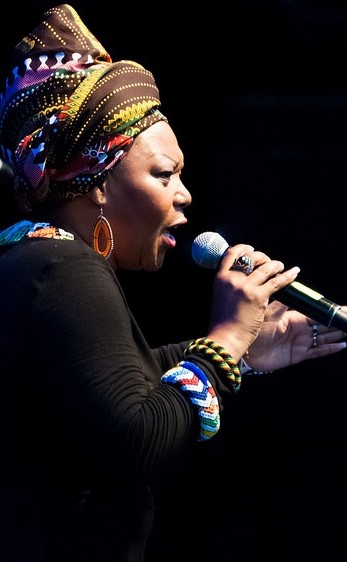
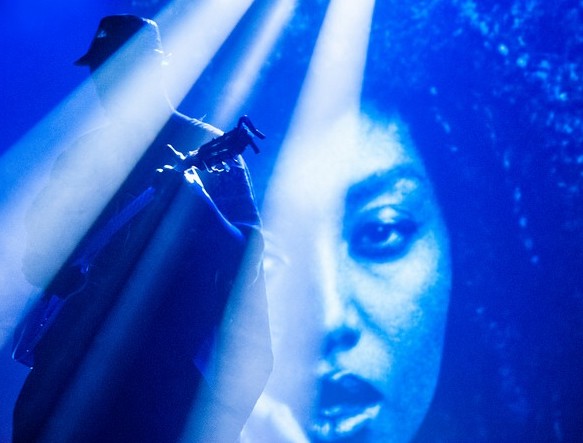


Photos
© Hanna
Donato
Photo #1
© Robert J. Lewis